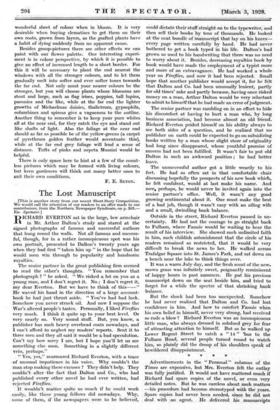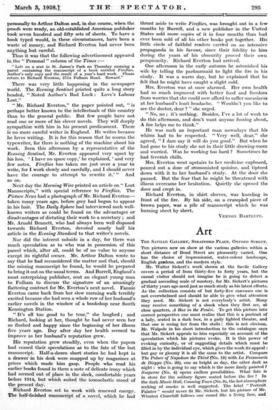The Lost Manuscript
[This is another story from our recent Short Story Competition. We would call the attention of our readers to an offer made to our contributors, from the Northern Newspaper Syndicate, on p. 303.— En. Spectator.] RICHARD EVERTON sat in the large, low armchair in Mr. Arthur Dalton's study and stared at the signed photographs of famous and successful authors that hung round the walls. Not all famous and success- ful, though, for in a rather inconspicuous spot was his own portrait, presented to Dalton's twenty years ago when they had first " taken him' up " in the hope that he would soon win through to popularity and handsorne royalties.
The senior partner 'in the great publishing firm seemed to read the other's. thoughts. " You remember that photograph ? " he asked. " We risked a lot on you as a young man, and I don't regret it No ; I don't regret it, my dear Everton. But we have to think of this—" He waved his hand in the direction of a large account- book he had just thrust aside. " You've had bad luck. Somehow you never struck oil. And now I suppose the War's altered people's tastes. Personally, I liked Fireflies very much. I think it quite up to your best level. Or very nearly so. Very sound stuff. But, you know, a publisher has such heavy overhead costs nowadays, and I can't afford to neglect my readers' reports. Sent it to three men and they all said it would be a bad speculation. Can't say how sorry I am, but I hope you'll let us see something else soon. Something in a slightly different vein, perhaps."
" Yes, yes," murmured Richard Everton, with a trace of unusual impatience in his voice.. Why couldn't the man stop making these excuses ? They didn't help. They couldn't alter the fact that Dalton and Co., who had published every other novel he had ever written, had rejected Fireflies.
It wouldn't matter quite so •much if he could work easily, like these young fellows did nowadays. Why, some of them, if the newspapers were to be believed, could dictate their stuff straight on to the typewriter, and then sell their books by tens of thousands. He looked at the neat bundle of manuscript that lay on his knees— every page written carefully by hand. He had never bothered to get a book typed in his life. Dalton's had grown so used to his handwriting that there was no need to worry about it. Besides, decreasing royalties book by book would have made the employment of a typist more and more of an extravagance. He had worked a whole year on Fireflies, and now it had been rejected. Small hope that another publisher would accept it, for he felt that Dalton and Co. had been unusually lenient, partly for old times' sake and partly because, having once risked money on a man, Arthur Dalton would be very reluctant to admit to himself that he had made an error of judgment.
The senior partner was rambling on in an effort to hide his discomfort at having to hurt a man who, by long business association, had become almost an old friend. Richard Everton prided himself on his ability always to see both sides of a question, and he realized that no publisher on earth could be expected to go on subsidizing books written by a man whose slight store of originality had long since disappeared, whose youthful promise of success had not been fulfilled. It wasn't fair to put old Dalton in such an awkward position ; he had better leave.
The unsuccessful author got a little -wearily to his feet. He had so often sat in that comfortable chair discussing hopefully the prospects of his new book which, he felt confident, would at last make his name. And now, perhaps, he would never be invited again into the senior partner's office. Well, it wasn't any good growing sentimental about it. One must make the best of a bad job, though it wasn't easy with an ailing wife and a small, dwindling bank balance.
Outside in the street, Richard Everton paused in un- certainty. He had not the courage to go straight back to Fulham, where Fannie would be waiting to hear the result of his interview. She showed such unlimited faith in him, such childish astonishment that the circle of his readers remained so restricted, that it would be very difficult to break the news to her. He walked across Trafalgar Square into St. James's Park, and sat down on a bench near the lake to think things over.
It was a warm July day, and the fresh scent of the new... mown grass was infinitely sweet, poignantly reminiscent of happy hours in past summers. He put his precious manuscript down on the seat beside him, and tried to forget for a while the spectre of that shrinking bank balance.
But the shock had been too unexpected. Somehow he had never realized that Dalton and Co. had lost confidence in him. And how to comfort Fannie when his own belief in himself, never very strong, had received so rude a blow ? Richard Everton was an inconspicuous little man, who always dressed in subdued grey for fear of attracting attention to himself. But as he walked up Lower Regent Street to catch a " 14 " 'bus to the Fulham Road, several people turned round to watch him, so plainly did the droop of his shoulders speak of bewildered disappointment.
- * * * Advertisements in the " Personal " columns of the Times are expensive, but Mrs. Everton felt the outlay was fully justified. It would not have mattered much if Richard had spare copies of the novel, or even very detailed notes. But he was careless about such matters —his procedure had become stereotyped with the years. Spare copies had never been needed, since he did not deal with an agent. He delivered his manuscripts personally to Arthur Dalton and, in due_ course, when the proofs were ready, an-old-established American publisher took seven hundred and fifty sets of sheets. To -have a book typed would, in these circumstances, have been a waste of money, and Richard Everton had never been anything but careful.
Thus it was that the following advertisement appeared in, the " Personal " column of the Times :— •
" Left on a seat in St. James's Park on Thursday morning a parcel containing the manuscript of a book entitled Fireflies. Author's only copy and the result of a year's hard work. Please return to Richard Everton, 275A Fulham Road. Reward."
There was very little happening in the newspaper world. The Evening Sentinel printed quite a long story headed, " Noted. Author's Bad Luck : Love's Labour Lost."
" Mr. Richard Everton," the paper pointed out, " is perhaps better known to the intellectuals of this country than to the general public. But few people have not read one or more of his clever novels. They will deeply sympathize with him in his present predicament. There is no more careful writer in England. He writes because he loves writing. It is for this reason that he scorns the typewriter, for there is nothing of the machine about his work. Seen this afternoon by a. representative of the Evening Sentinel, Mr. Everton appeared very upset, by his loss. ` I have no spare copy,' he explained, ` and very few notes. Fireflies has taken me just over a year to write, for I work slowly and carefully, and I should never have the courage to attempt to rewrite it.' " And so on.
Next day the Morning Wire printed an article on " Lost Manuscripts," with special reference to Fireflies. The Picture News had a photograph of Mr. Richard Everton- taken many years ago, before grey had begun to appear in his hair. The Daily Sphere had interviewed such well- known writers as could be found on the advantages or disadvantages of dictating their work to a secretary ; and Mr. Arnold Bennett, who had always been well disposed towards Richard Everton, devoted nearly half his article in the Evening Standard to that writer's novels.
Nor did the interest subside in a day, for there was much speculation as to who was in possession of this parcel which, after all, could be of no value to anyone except its rightful owner. Mr. Arthur Dalton wrote to say that he had reconsidered the matter and that, should the missing manuscript be found, he would be prepared to bring it out on the usual terms. And Burrell, England's most enterprising publisher, sent an elegant young man to Fulham to discuss the signature of an amazingly flattering contract for Mr. Everton's next novel. Fannie Everton came back from her slow morning walk terribly excited because she had seen a whole row of her husband's earlier novels in the window of a bookshop near South Kensington Station.
" It's all too good to be true," she laughed ; and Richard, looking at her, thought he had never seen her so flushed and happy since the beginning of her illness five years ago. Day after day her health seemed to improve as her husband's reputation grew.
His reputation grew steadily, even when the papers had ceased their speculations as to the fate of the lost manuscript. Half-a-dozen short stories he had kept in a drawer in his desk were snapped up by magazines at prices which made him gasp. People who read his earlier books found in them a note of delicate irony which had seemed out of place in the sleek, comfortable years before 1914, but which suited the iconoclastic mood of the present day.
Richard Everton set to work with renewed energy. The half-finished manuscript of a novel, which he had thrust aside to write Fireflies, was brought out in a few months by Burrell, and a new publisher in the United States -sold More - copies of it in four months than had ever been sold of all his other books put together. His little circle of faithful readers carried on an intensive propaganda in his favour, since their fidelity to him during the years of his obscurity proved their own perspicacity. Richard Everton had arrived.
One afternoon in the early autumn he astonished his wife by telling the parlourmaid to light the fire in his study. It was a warm day, but he explained that he felt that he might have caught a slight cold.
Mrs. Everton was at once alarmed. Her own health had so much improved with better food and freedcim from worries that she could now afford to suffer uneasiness at her husband's least headache. " Wouldn't you like to see the doctor, dear ? " she urged.
" No, no ; it's nothing. Besides, I've a lot of work to do this afternoon, and don't want anyone fussing about. A fire helps me to think."
He was such an important man nowadays that his whims had to be respected. " Very well, dear," she agreed, " I dare say it will do you good." But when he had gone to his study she sat in their little drawing-room and worried. Was he working too hard ? Sometimes he had feverish chills.
Mrs. Everton went upstairs to her medicine cupboard, poured out a dose of ammoniated quinine, and tiptoed down with it to her husband's study. At the door she paused. But the fear that he might be threatened with illness overcame her hesitation. Quietly she opened the door and crept in.
Richard Everton, in shirt sleeves, was kneeling in front of the fire. By his side, -on a crumpled piece of brown paper, was a pile of manuscript which he was burning sheet by sheet.
VERNON BARTLETT.































































 Previous page
Previous page